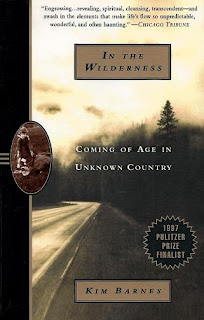By Kim Barnes
Kim grew up in the logging communities of Idaho. Her parents had fled poverty from the southwestern states and settled in the woodsy towns and company towns of the logging industry. Her father worked as a logger and they were joined by other family members looking for a better life too. Kim's parents came from backgrounds of alcoholism, poverty, abusiveness, and failure. Her father and mother found direction and solace by joining a Pentacostal church whose teachings helped them overcome the addictions inherent in their very DNA. The father became the demanding authoritarian figure he believed the Bible required him to be. The mother became the submissive, subdued and obedient servant she believed the Bible required her to be.
Raised to believe the inerrant truth of the Bible, Kim followed her parents' lead and tried to be the submissive, subdued and obedient daughter she was told the Bible required her to be. But then she became an adolescent and the family moved from the woods to town. The pressures of teenage life and the urge to conform to her peers created conflict between Kim and her parents. She began to rebel. She no longer wanted to wear the long dresses, the knee stockings and the braids in her hair deemed proper for a girl her age. She wanted to be like the other kids and wear jeans, and shave her legs and wear makeup and go to parties. She didn't like being an outsider, like most kids, she wanted to be part of the group. Her anger about the restrictions of her parents' fundamentalist religion drove her to more extreme forms of rebellion, ending up with her running away from home. But she was soon back home and her parents gave her a choice: reform school or back to the woodsy community to live with the Pentacostal preacher and his family. She chose the preacher.
Once settled in with the preacher's family, Kim again conformed to behavior expected of her gender. Cook and clean, do the chores, be quiet, be submissive and obedient. But despite her best efforts, the preacher and his family turned against her and claimed she had brought demons into the home and that she was trying to seduce one of the men of the family.
So back home with her parents and little brother, once again Kim toed the line and tried to fit herself into the mold required of her. But, now moving into adulthood, she began to question the unfairness of it all. How she was made to feel sinful simply because she was female, simply because she was pretty. At eighteen, after graduating from high school, she moved out when her father wouldn't let her go on a camping trip with a group of teens from her school. He gave her an ultimatum: if she left to go on the trip, she couldn't come back home to live. So she left and made her way in the world on her own.
This book describes way of a life that is pretty much anti everything I care about. They were deeply religious. They hunted and fished. They cut down the forest and damned the rivers, polluted the air and poisoned the water and saw nothing wrong with it. Their religion imposed ridiculous standards on people but completely failed to teach reverence for God's creation.
I found it hard to sympathize with her story and of how she went from one extreme to the other, from super-pious, super-religious (she even spoke in tongues and was a faith healer) to out-of-control, raging teen rebellion. I found it shocking how blind she and her family were to the destruction of the wilderness they supposedly loved and how gutless they seemed in their willingness to bow to the silly dictates of their extremist religion.
So even though I didn't have a lot of sympathy for her or her religion-addled parents, I still enjoyed the story and I am glad she was able to free herself in the end.
Kirkus Review: https://www.kirkusreviews.com/book-reviews/kim-barnes/in-the-wilderness/.
Subscribe to:
Post Comments (Atom)


No comments:
Post a Comment